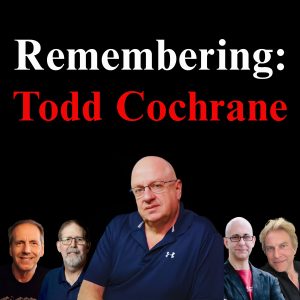 In this episode titled “Podcast Movement Recap and Insights,” hosts Todd Cochrane and Rob Greenlee discuss their experiences and observations from the recent Podcast Movement conference held in Dallas. Todd has also posted a piece on Linkedin that has garnered nearly 8000 views.
In this episode titled “Podcast Movement Recap and Insights,” hosts Todd Cochrane and Rob Greenlee discuss their experiences and observations from the recent Podcast Movement conference held in Dallas. Todd has also posted a piece on Linkedin that has garnered nearly 8000 views.
Todd kicks off the conversation by expressing gratitude for the listeners. Rob brings up the theme “show me the money,” which reflects a mixture of seriousness and humor regarding the event. Todd shares his experience of arriving on a Sunday, noting that he could have saved on hotel costs by arriving later, given the event’s setup schedule.
Both hosts discuss the presence of vendors at the conference, with Todd commenting on the impressive booth from Libsyn compared to other vendors, resulting in a total of about twenty vendors. Rob adds context for those unfamiliar with Podcast Movement, describing it as historically significant and the largest podcasting conference, although he notes that it may no longer hold that title. They express concerns over attendance numbers, suggesting that the conference may be losing its prominence compared to other events, such as Podfest.
As they delve deeper, Todd notes that many attendees seemed to be local and not diverse enough geographically in terms of representation. They discuss the financial aspects of attending the event, including ticket costs and discounts provided for local attendees. Todd expresses relief that the discounted tickets helped increase attendance.
The conversation shifts to a significant announcement made during the conference regarding Podcast Movement’s acquisition of Sounds Profitable. They discuss the implications of this acquisition and the confusion surrounding the language used to describe the transaction, which is defined as both an acquisition and a merger. Todd shares his initial reactions and interactions with key players from Sounds Profitable, expressing hope for future creator engagement.
Rob and Todd then reflect on the event’s atmosphere and traffic. While they experienced slow periods, Todd is satisfied with the overall attendance, noting that they ultimately scanned around 100 badges. They discuss the mix of people they interacted with, some looking to shift their hosting platforms, while others were starting.
The hosts discuss potential issues affecting the podcasting space, including stagnation in creator numbers and retention concerns. Critical discussions within the industry arise, reflecting on whether podcasting can maintain its independence while embracing mainstream media and the expectations of profitability.
They also discuss practical considerations for future events, including potential changes in scheduling and structure to appeal to both business professionals and creators. Rob suggests the need for one-day passes and more targeted marketing to effectively engage local audiences.
Todd expresses his hope for improvements, highlighting the possibility of creating a space for a truly educational experience that is free from self-promotion. They both emphasize the importance of creating a balanced program that prioritizes genuine teaching and sharing knowledge rather than merely promoting products or platforms.
By the end of the episode, Todd shares some insights regarding industry trends, drawing attention to the need for widespread understanding of Open RSS and its importance in sustaining the podcasting ecosystem. They conclude with acknowledgments, inviting their audience to send feedback and highlighting key people in the podcasting community, while looking forward to future developments and discussions.
The episode wraps up with both hosts thanking their listeners and affirming their return for the next episode.
The post Podcast Movement Recap and Insights #641 appeared first on New Media Show.
Podcast: Play in new window | Download








